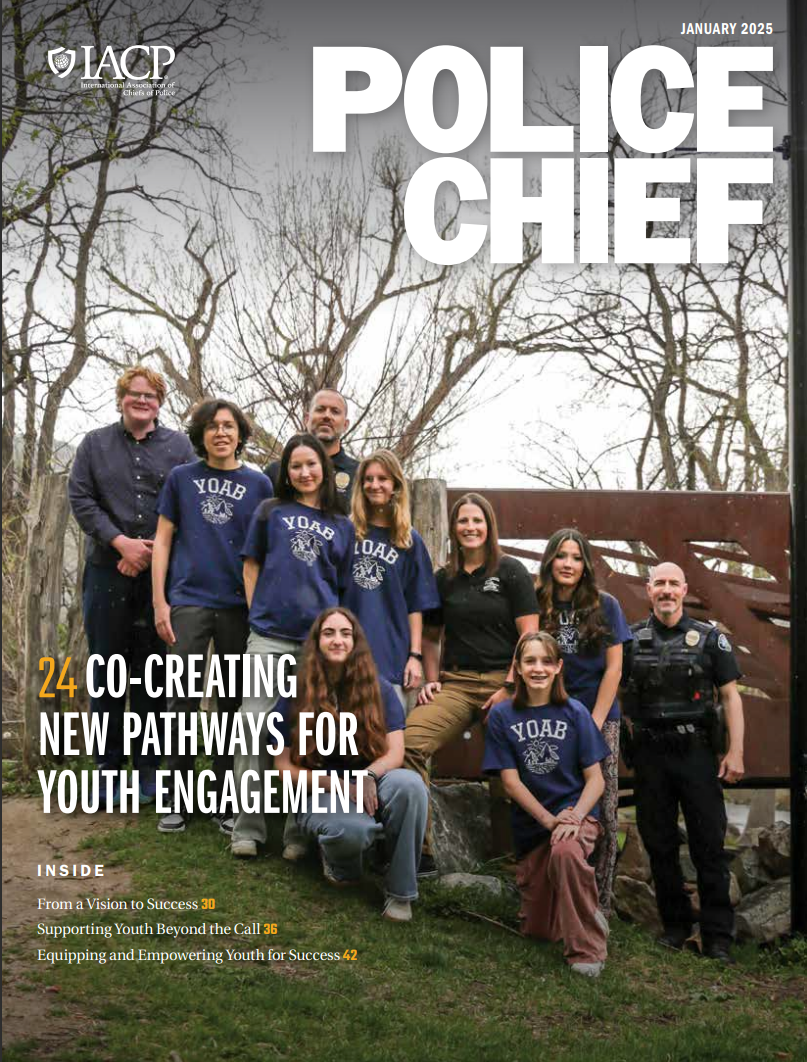| IACP Working for You |
|---|
|
In the mission to support the law enforcement leaders of today and develop the leaders of tomorrow, the IACP is constantly involved in advocacy, programs, research, and initiatives related to cutting-edge issues. This column keeps you up to date on IACP’s work to support our members and the field of law enforcement. Midsize Agencies Sections—Results of 2013 COPS-funded In 2013, the IACP Midsize Agencies Section set out to fulfill its promise to serve as an incubator for innovative police practices. With support and input from the Office of Community Oriented Policing Services (COPS Office), the section convened more than 40 police leaders and city managers to discuss their successes and challenges under the theme Sustaining and Advancing Community Policing in the New Economy. Through an interactive facilitated discussion, participants were asked three questions: In a time of increasing demands and diminishing resources, how is your agency
Participating chiefs and city managers offered successful examples and case studies, candidly discussed challenges, and offered thought-provoking considerations and solutions for the future, proving midsize agencies are leaning forward in many ways. The results are summarized in a new publication from the IACP and COPS Office, entitled Midsize Police Agencies: Surviving, Thriving, and Forging a New Business Model for Law Enforcement in a Post-Recession Economy. For more information or to get involved with the Midsize Agencies Section, visit www.theiacp.org/Midsize-Agencies-Section or email phillips@theiacp.org.
IACP Summit on Police-Community Relations IACP recognizes that no single factor has been more crucial to reducing crime levels than the partnership between law enforcement agencies and the communities they serve. High-profile incidents and allegations of police misconduct may drive a wedge between law enforcement officers and the citizens they are sworn to protect. Therefore, in August 2014, IACP President Yousry “Yost” Zakhary announced an upcoming summit that will bring together leaders in law enforcement, communities, academia, and policy development to discuss concerns and ideas and examine the current state of police-community relations, the evolving landscape of threats that confront law enforcement, and the need for policies and procedures that ensure fair and equitable policing practices. To read President Zakhary’s statement, please visit www.theiacp.org/portals/0/documents/pdfs/IACPsummitpressrelease.pdf.
Seeking Pilot Sites for Vicarious Trauma Toolkit The Vicarious Trauma Toolkit (VTT) Project, funded by the Office for Victims of Crime (OVC), was born out of the critical need to address vicarious trauma in first responders who offer support to victims of crime and are routinely exposed to violent traumatic events. The VTT will be an online repository of tangible tools and resources collected from a nationwide survey of first responder agencies. Pilot sites are now being sought by IACP and Northeastern University (Boston, Massachusetts) to participate in a project to implement and evaluate a toolkit addressing vicarious trauma and to test-drive the VTT to ensure that it meets the intended purpose of providing a practical resource for agencies to identify and respond to vicarious trauma experienced by law enforcement, firefighters, emergency medical services (EMS) providers, victim assistance professionals, and other first responders. ? For more information, visit www.northeastern.edu/iuhrp/projects/current/vicarious-trauma-toolkit-vtt or email VTToolkit@neu.edu. |


